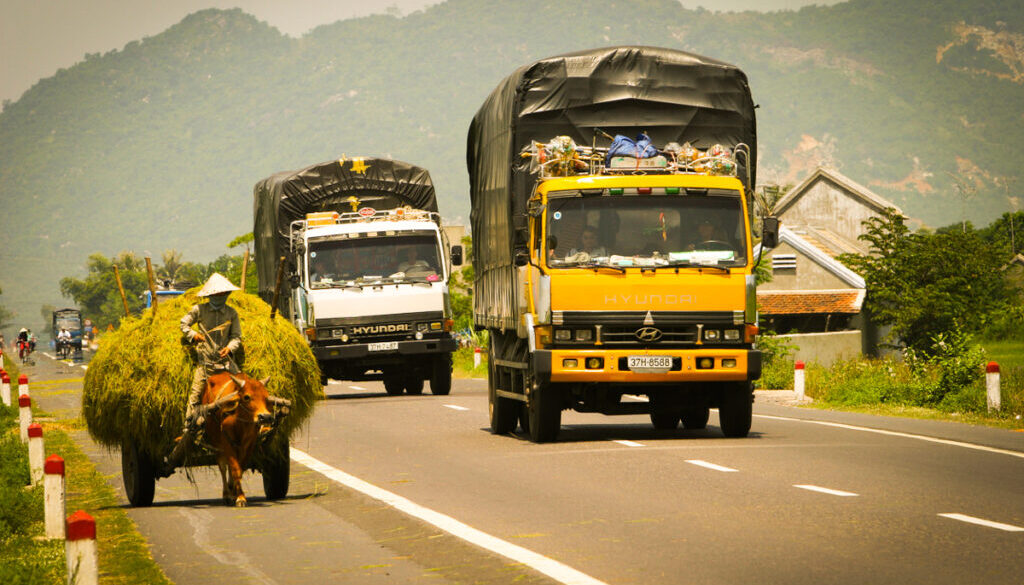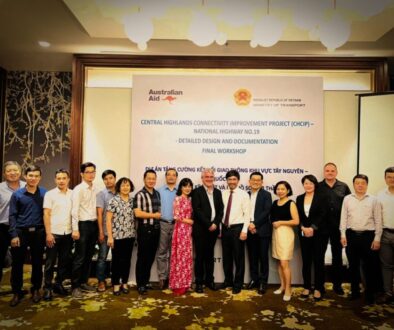Vehicle Overloading Control: a key element to enhance transport connectivity and optimise road durability
IN BRIEF
Enhancing transport connectivity is essential for social and economic growth since it gives opportunities for people to access basic services, education and healthcare. It also opens up regional and national trade, job opportunities, and attracts more investment. However, there are many risk factors that can negatively affect the road network. In Vietnam, vehicle overloading has been a major problem, causing damaged roads and other relevant issues, such as severe traffic accidents, air pollution, logistics disruption and inefficient infrastructure investment.
Aus4Transport, a partnership program between the Australian Government and Government of Vietnam in the transport sector, supports the Ministry of Transport to ensure all matters of transport connectivity are addressed from different approaches and through a wide range of activities in, both, engineering and non-engineering aspects.
As complementary to the Detailed Design and Documentation Activity for the Northern Mountain Provinces Transport Connectivity Project (NMPTCP), Aus4Transport has just started a new activity “Design of the Axle Load Control Program (DALCP). This activity addresses vehicle overloading issues in the project area by providing specific measures to control vehicle load up to the maximum permitted weight on the road surface. The activity will support for identify and mitigating the negative impacts of overloading, such as deterioration of road pavement and bridges, and assist with increasing road safety, optimising the road durability, and, overall, contributing to accelerate the economic, social-cultural and environmental development of the region.
KNOW MORE…
Whilst overloading is not recognized as a major component of transport disruption and real economic loss, the problems raised by overloaded heavy vehicles are significant.
From the vehicle perspective, especially that of trucks, overloading is a threatening factor to road safety and air pollution, which doesn’t only reduce the vehicle’s service life, but also causes potential risks, such as instability, stiff steering, and difficulty to quickly control the speed in case of a sudden emergency, which can lead to fatal road accidents for the road users. In addition, many studies have shown that excessive vehicle load remarkably increases fuel consumption and carbon emissions.
From the road infrastructure perspective, overloading practices is often ignored or underestimated as a real economic loss. However, a study carried out by the Asian Development Bank (ADB) emphasized how efficient control on overloading vehicles would support Vietnam to prevent millions of dollars of damage. It is estimated that the current measures in place save Vietnam US$120 million in damages.
The study also revealed that, generally, having weight control on a main road reduces its potential damage by 50%, compared with having no controls; and if better supervision and enforcement are in place, another 30% reduction can be achieved.
Unfortunately, despite all the strict measures to tighten the management of transport enterprises and control vehicle weight which have been applied for the last few years, trucks that have been modified to carry heavier loads are still operating in many provinces and it seems there has been an increasing trend during the pandemic.
According to a report from the Directorate for Roads of Vietnam (DRVN), in 2019, out of more than 181,000 trucks investigated at vehicle load checking stations, nearly 19,000 trucks were carrying excessive weight, leading to the withdrawal of 6,500 driving licenses and VND195 billions (approx.US$8.4 millions) in fines.
Many local to national roads in Vietnam have been seriously damaged since their early stages of operation. This can be explained by absence of appropriate maintenance, unawareness of overloading consequences from road users, as well as a lack of efficient control measures, including checking stations, inappropriate weighbridge, and weak law enforcement of government regulations. Additionally, poor management from local authorities is also another factor that leads to inefficient control.
Understanding the importance of vehicle overloading issues, Aus4Transport has proposed to finance the “Design of the Axle Load Control Program” for the Northern Mountain Provinces Transport Connectivity Project (NMPTCP), in the underdeveloped provinces of the north-western mountains of Vietnam, ensuring all these matters are fully tackled. The activity will design a comprehensive program, which will be implemented in NMPTCP roads before and during the construction period, to improve the regional connectivity and accessibility to the Greater Mekong Subregion corridors through safe and good condition roads.
In terms of work scope and strategic intent, the activity doesn’t provide an independently designed control program, but it ensures compliance with national regulations, complementing all existing measures that will be implemented in the project area, based on the specific needs and requirements from local authorities and other stakeholders. The program will address overloading issues by proposing a successful mix of effective vehicle axle-load control policies, practices, and operational procedures. The control program has a long-term vision and it is expected to be followed and applied in other projects across the country.
Up until now, the detailed list of activities and expected timeline have already been approved by the Ministry of Transport. In the next stages, a wide range of tasks will be carried out, including a deep review of the current measures and practices, operational manuals in place and the Vietnamese legal framework related to vehicle overloading. The activity will require some field trips to the provinces of Lao Cai, Lai Chau and Yen Bai for close consultation with local authorities. A workshop will be conducted towards the end of the activity to collect feedback and comments from all stakeholders before the submission of the final program design.
The new ALCP is a key element to enhance the transport network in the Northern Mountain provinces. It will optimise the road investment and support the growth of the regional economy, contributing to Aus4Transport main goal of supporting the socio-economic development of Vietnam and reducing poverty.




